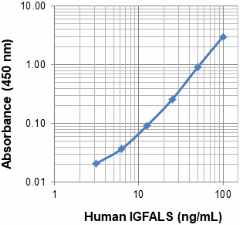- Regulatory Status
- RUO
- Other Names
- ACLSD, ALS, insulin-like growth factor binding protein, acid labile subunit
- Ave. Rating
- Submit a Review
- Product Citations
- publications

| Cat # | Size | Price | Quantity Check Availability | Save | ||
|---|---|---|---|---|---|---|
| 758809 | 4 pack | 76€ | ||||
The insulin-like growth factors (IGFs) are found in binary complexes with members of IGF-binding protein family (IGFBP-1 to -6). IGFALS is the acid-labile subunit of the IGF binding protein complex that forms ternary complexes with IGFs and IGFBP-3/IGFBP-5. IGFALS has no affinity for free IGFs and has a very low affinity for uncomplexed IGFBP-3/IGFBP-5, but readily binds to the IGFs and IGFBP-3/IGFBP-5 complex, which extends the serum half-lives of IGFs. IGFALS is mainly produced by the liver and is exclusively found in high concentration in postnatal serum. IGFALS production is predominantly stimulated by the growth hormone. Mutations in IGFALS causes ALS, amyotrophic lateral sclerosis, deficiency, which manifests itself as delayed and slow puberty. IGFALS mutations have also been associated with insulin resistance. Mature IGFALS protein is composed of 578 amino acids with 20 leucine-rich repeats. It shares 93% identity between mouse and rat, and 79% between mouse and human.
Product DetailsProduct Details
- Source
- Human IGFALS, amino acids (Ala28 -Cys605) (Accession# NP_002382.1), was expressed in CHO cells.
- Molecular Mass
- The 593 amino acid recombinant protein has a predicted molecular mass of approximately 65 kD. The protein migrates at approximately 75 kD in both DTT-reducing and non-reducing conditions by SDS-PAGE. The predicted N-terminal amino acid is Ala.
- Purity
- >95%, as determined by Coomassie stained SDS-PAGE.
- Formulation
- Lyophilized in sterile-filtered PBS, pH 7.2, containing 10% BSA, 0.09% sodium azide, and protease inhibitors.
- Concentration
- Lot-specific (to obtain lot-specific concentration and expiration, please enter the lot number in our Certificate of Analysis online tool.)
- Storage & Handling
- Unopened vials can be stored between 2°C and 8°C until the expiration date. Prior to use, reconstitute the lyophilized powder with 0.2 mL of PBS containing a carrier protein (e.g., 1% BSA, protease free), pH7.4. Re-cap vial, vortex. Allow the reconstituted standard to sit at room temperature for 15 minutes, vortex again to mix completely. The reconstituted standard stock solution can be aliquoted into polypropylene vials and stored at -70°C for up to one month. Do not re-use diluted standards. Avoid repeated freeze/thaw cycles.
- Application
-
ELISA - Quality tested
- Recommended Usage
-
Each lot of this protein is quality control tested by ELISA assay. For use as an ELISA standard, a standard curve comprised of doubling dilutions from 3.75 - 120 ng/mL is suggested. It is recommended that the reagent be titrated for optimal performance for each application.
- Application Notes
-
This IGFALS protein is useful as a standard for a human IGFALS sandwich ELISA, using unlabeled M6005C04 antibody (Cat. No. 537302) as capture and biotinylated M6001E07 antibody (Cat. No. 537404) as detection.
Antigen Details
- Distribution
-
Produced by the liver and is mainly found in the postnatal serum.
- Function
- IGFALS production is stimulated by growth hormone and is important for extending the serum half life of IGF.
- Interaction
- IGF-1/IGF-2 and IGFBP-3/IGFBP-5 binary complexes.
- Ligand/Receptor
- IGF-1/IGF-2 and IGFBP-3/IGFBP-5 binary complexes.
- Bioactivity
- Forms ternary complex with IGFs and IGFBP-3/IGFBP-5 binary complexes.
- Biology Area
- Angiogenesis, Apoptosis/Tumor Suppressors/Cell Death, Cancer Biomarkers, Cell Biology, Cell Cycle/DNA Replication, Cell Proliferation and Viability, Signal Transduction
- Molecular Family
- Carrier Proteins
- Antigen References
-
- Baxter RC, Dai J. 1994. Endocrinology. 134:848-852.
- Twigg SM, Baxter RC. 1998. J Biol Chem. 273(11):6074-9.
- Khosravi MJ, et al. 1997. J Clin Endocrinol Metab. 82:3944-3951.
- Domene HM, et al. 2004. New Eng J Med. 350:570-577.
- Domene HM, et al. 2005. J Endocrinol Invest. 28(5):43-6.
- Gene ID
- 3483 View all products for this Gene ID
- UniProt
- View information about IGFALS on UniProt.org
 Login / Register
Login / Register 














Follow Us